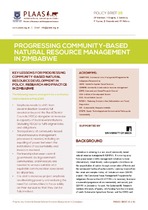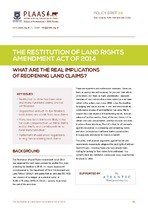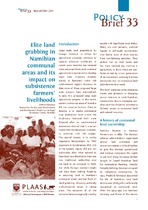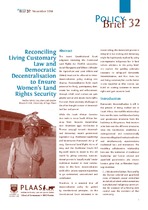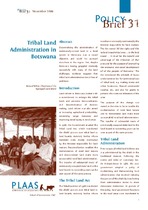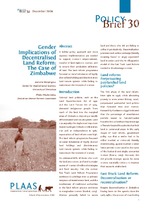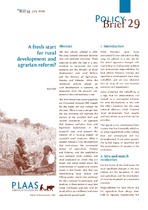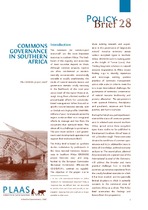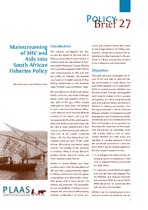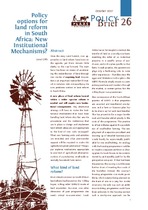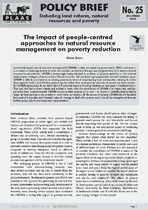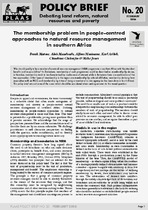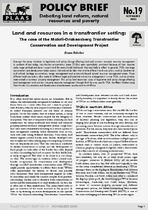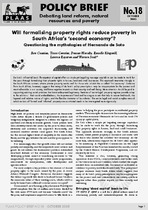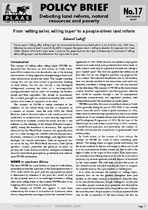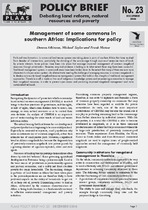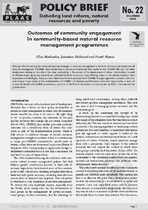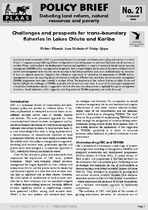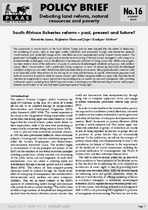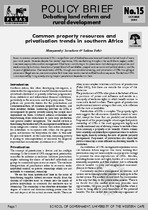Policy Briefs: Recent submissions
Now showing items 101-120 of 144
-
Progressing community-based natural resource management in Zimbabwe
(Institute for Poverty, Land and Agrarian Studies, University of the Western Cape, 2014)Zimbabwe is ushering in a new era of community-based natural resource management (CBNRM). It is moving away from place-based wildlife management initiatives to more internationally linked forestry carbon projects which ... -
What are the real implications of reopening land claims?
(Institute for Poverty, Land and Agrarian Studies, University of the Western Cape, 2014)The Restitution of Land Rights Amendment Act of 2014 has reopened the land claims process for another five years, extending the deadline to 2019. An impact assessment commissioned by the Department of Rural Development ... -
Elite land grabbing in Namibian communal areas and its impact on subsistence farmers’ livelihoods
(Institute for Poverty, Land and Agrarian Studies, University of the Western Cape, 2011)Large scale land acquisitions by foreign investors in Africa for agricultural purposes continue to capture attention worldwide. In recent years Namibia has received some proposals from multi-national agricultural ... -
Reconciling living customary law and democratic decentralisation to ensure women’s land rights security
(Institute for Poverty, Land and Agrarian Studies, University of the Western Cape, 2010)The recent Constitutional Court judgment rendering the Communal Land Rights Act (CLARA) unconstitutional (Tongoane and Others v Minister for Agriculture and Land Affairs and Others) must not be allowed to throw dec ... -
Tribal land administration in Botswana
(Institute for Poverty, Land and Agrarian Studies, University of the Western Cape, 2009)Decentralising the administration of communally-owned land to a local system in Botswana was a sound objective and could be pursued elsewhere in the region. Yet, despite Botswana having grappled relatively successfully ... -
Gender implications of decentralised land reform: The case of Zimbabwe
(Institute for Poverty, Land and Agrarian Studies, University of the Western Cape, 2009)A bolder policy approach and more vigorous implementation are needed to support women’s empowerment, transfer of land rights to women, and to ensure their productive utilisation of land. The land reform programme focussed ... -
A fresh start for rural development and agrarian reform?
(Institute for Poverty, Land and Agrarian Studies, University of the Western Cape, 2009)The commons (or common-pool resources)1 are the most important resources in southern Africa. The livelihoods of the majority and economies of most countries depend on them. Although common property regimes are often ... -
Commons Governanace in South Africa
(Institute for Poverty, Land and Agrarian Studies, University of the Western Cape, 2009)The commons (or common-pool resources)1 are the most important resources in southern Africa. The livelihoods of the majority and economies of most countries depend on them. Although common property regimes are often ... -
Mainstreaming of HIV and Aids into South African Fisheries Policy
(Institute for Poverty, Land and Agrarian Studies, University of the Western Cape, 2008)This research investigated the drivers and the impact of HIV and Aids in fishing communities in South Africa, in order to assist the Department of Environmental Affairs and Tourism: Marine and Coastal Management ... -
Policy options for land reform in South Africa: New Institutional Mechanisms?
(Institute for Poverty, Land and Agrarian Studies, University of the Western Cape, 2007)Since the 2005 Land Summit, new approaches to land reform have been on the agenda, yet there remains little clarity on the way forward. The main focus has been on means of accelerating the redistribution of land ... -
The impact of people-centred approaches to natural resource management on poverty reduction
(Institute for Poverty, Land and Agrarian Studies, University of the Western Cape, 2006)Community-based natural resource management (CBNRM) is often promoted by governments, NGOs and donors as a means of reducing poverty in rural communities, particularly through income-generation from various natural res ... -
The membership problem in people-centred approaches to natural resource management in Southern Africa
(Institute for Poverty, Land and Agrarian Studies, University of the Western Cape, 2006)Who should qualify to be a member of a natural resource management (NRM) programme in Southern Africa with the attendant benefits and responsibilities? In Zimbabwe, membership of such programmes could be described as ... -
Land and resources in a transfrontier setting
(Institute for Poverty, Land and Agrarian Studies, University of the Western Cape, 2005)Amongst the many initiatives in legislative and policy change affecting land and common property resource management in Southern Africa today, transfrontier conservation areas (TFCAs) seem particularly prominent because ... -
Will formalising property rights reduce poverty in South Africa’s ‘second economy’?
(Institute for Poverty, Land and Agrarian Studies, University of the Western Cape, 2005)De Soto’s influential book The mystery of capital offers a simple yet beguiling message: capitalism can be made to work for the poor, through formalising their property rights in houses, land and small businesses. This ... -
From ‘willing seller, willing buyer’ to a people-driven land reform
(Institute for Poverty, Land and Agrarian Studies, University of the Western Cape, 2005)The concept of ‘willing seller, willing buyer’ has dominated the discourse on land reform in South Africa since 1994. Now, following the national Land Summit of July 2005, it appears that government is willing to abandon ... -
Management of some commons in southern Africa: Implications for policy
(Institute for Poverty, Land and Agrarian Studies, University of the Western Cape, 2006)Profound transformations in communal land tenure systems are taking place in parts of southern Africa that have resulted from decades of interventions, particularly the shrinking of the commonage through capture of extensive ... -
Outcomes of community engagement in community-based natural resource management programmes
(Institute for Poverty, Land and Agrarian Studies, University of the Western Cape, 2006)Although the last century has witnessed exciting strategies in resource management in the form of community-based natural resource management (CBNRM), these developments are more incremental than revolutionary. CBNRM falls ... -
Challenges and prospects for trans-boundary fisheries in Lakes Chiuta and Kariba
(Institute for Poverty, Land and Agrarian Studies, University of the Western Cape, 2006)Community-based conservation (CBC) is a prominent feature of conservation and development policy and practice in southern Africa. It is a generic concept defining different configurations of controlling access to and use ... -
South African fisheries reform – past, present and future?
(Institute for Poverty, Land and Agrarian Studies, University of the Western Cape, 2004)Two approaches to transformation of the South African fishery industry were adopted after the advent of democracy: the broadening of access rights to new rights holders (individuals and companies) through state intervention ... -
Common property resources and privatisation trends in Southern Africa
(Institute for Poverty, Land and Agrarian Studies, University of the Western Cape, 2004)Access to common property resources (CPRs) is a significant part of the land resource base and therefore the livelihoods of many poor rural people. However, despite their central importance, CPRs are declining throughout ...

